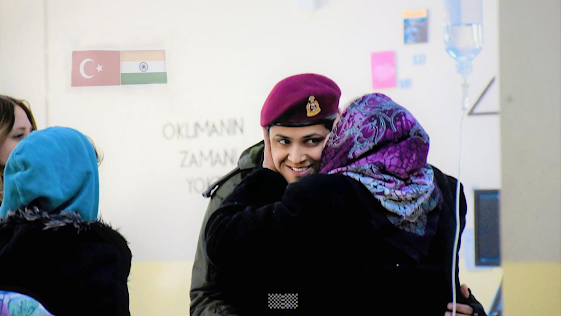India, positioned as a rising global power, has strategically embraced multilateralism as a cornerstone of its foreign policy. Multilateralism involves nations collaborating through international institutions and forums to address global challenges and promote shared objectives. India's active engagement in these multilateral platforms has not only bolstered its global standing but also served as a potent tool to further its foreign policy goals.
Multilateral Engagement for National Interests:
Multilateral forums offer India a unique opportunity to assert its interests on the world stage. Participation in groups like the BRICS, G20, and the Shanghai Cooperation Organization (SCO) has allowed India to advocate for its priorities, including economic growth, regional stability, and reform in global governance. By actively participating in these forums, India can shape discussions and policies that align with its national interests.
The SCO provides India with a platform to engage with Central Asian countries on issues of mutual interest, including counter-terrorism and economic cooperation. By participating in these multilateral forums, India not only protects its national interests but also contributes to the formulation of global policies that are inclusive and reflective of the diverse perspectives of the member nations.
Leveraging Soft Power through Multilateralism:
India's rich cultural heritage and humanitarian initiatives have helped build its soft power. Multilateralism has enabled India to leverage its soft power by engaging in cultural exchanges, humanitarian aid, and development assistance. Such initiatives have not only strengthened India's global image but also allowed it to project its values and ideals on the international stage, fostering goodwill and cooperation.
Through platforms like the United Nations Educational, Scientific and Cultural Organization (UNESCO) and the United Nations Development Programme (UNDP), India actively participates in cultural exchanges and development projects. These initiatives not only showcase India's cultural diversity but also contribute to global efforts to address issues such as poverty, education, and healthcare.
India's commitment to multilateral humanitarian aid, particularly during times of crises, has been evident in its response to natural disasters and public health emergencies. By collaborating with international organizations and other nations, India extends a helping hand, further enhancing its reputation as a responsible and compassionate global player. Some important examples of Indian Govt. carrying out humanitarian activities in different parts are:
1. Operation Dost: India has launched 'Operation Dost' to extend assistance to Turkey and Syria, the nations hit by an intense 7.9-magnitude earthquake and subsequent aftershocks . A field hospital set up by the Indian Army in Hatay province of Turkey has become operational with surgical and emergency wards to provide succour to the affected people days.
Indian Air Force's C17 Globemaster aircraft with medical equipment, ration and relief equipment took off for Turkey, as part of 'Operation Dost'.
Addressing Global Challenges:
Multilateralism is vital for addressing pressing global issues, including climate change, terrorism, and pandemics. India has played a proactive role in forums like the Paris Climate Agreement and the International Solar Alliance, championing clean energy and climate action. By collaborating with other nations in these initiatives, India has demonstrated its commitment to addressing global challenges while safeguarding its national interests.
In the Paris Climate Agreement, India has committed to ambitious targets for reducing carbon emissions and promoting sustainable development. Through the International Solar Alliance, India leads efforts to harness solar energy for global sustainability. These initiatives not only contribute to global environmental goals but also position India as a responsible and forward-thinking nation on the world stage.
India's active involvement in international efforts to counter terrorism is evident in its collaboration with various countries and organizations. By participating in forums like the United Nations Counter-Terrorism Centre (UNCCT) and the Financial Action Task Force (FATF), India works towards creating a secure and stable global environment.
Fostering Regional Stability:
Multilateralism extends beyond the global stage; it plays a crucial role in promoting regional stability. India has actively participated in regional forums such as the South Asian Association for Regional Cooperation (SAARC), the Bay of Bengal Initiative for Multi-Sectoral Technical and Economic Cooperation (BIMSTEC), and the Indian Ocean Rim Association (IORA). These platforms facilitate dialogue, cooperation, and integration among neighbouring countries, contributing to regional peace and stability.
In SAARC, India collaborates with neighboring countries to address regional challenges and promote economic cooperation. The BIMSTEC platform, comprising nations around the Bay of Bengal, allows for enhanced connectivity and economic integration. The IORA provides a forum for dialogue and cooperation among Indian Ocean rim countries, ensuring maritime security and sustainable development in the region.
In an increasingly interconnected world, multilateralism serves as a linchpin of India's foreign policy. By actively engaging in international forums, India advances its interests, amplifies its soft power, addresses global challenges, and fosters regional stability. As India continues to evolve as a global player, its commitment to multilateralism remains steadfast, serving as a testament to the enduring strength of its foreign policy. The strategic utilization of multilateral platforms allows India to navigate the complex geopolitical landscape, contributing to a more inclusive and cooperative global order. Through a comprehensive approach that combines economic diplomacy, soft power projection, and collaborative problem-solving, India demonstrates its commitment to shaping a better future for itself and the world.








0 Comments
Share Your Views..